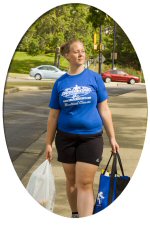


Creating Change >
Individual Level: Health
Health is wealth.
Physical health, mental health, and perceptions of health all play an important role in an individual’s ability or willingness to participate in physical activity.
Health Benefits of Physical Activity
For the most part, focus group participants were aware of and familiar with the health benefits of physical activity. Their awareness of the link between physical activity and good health echoed research that suggests physical activity provides a way to:
- Maintain good health
- Improve physical health (e.g., stronger muscles and bones, improved cardiovascular health, greater lung capacity, etc.)
- Improve existing health conditions or keep them in check
- Deal with stress and depression
- Be a positive role model for children and grandchildren
I find [physical activity] really helpful with just coping with demands.
Older adult focus group participant
I think the number one [reason] . . . I want to do physical activity is the knowledge that if I don’t come to the Steadward Centre and do exercises and whatever, my muscles will atrophy and I’ll wind up in a worse condition than I am, unable to do anything for myself.
Focus group participant with a disability
Concerns About the Possible Negative Impact of Physical Activity on Health
 Focus group participants also voiced concerns about the ways that physical activity might have a negative impact on their health. They worried about:
Focus group participants also voiced concerns about the ways that physical activity might have a negative impact on their health. They worried about:
- Existing health conditions that might be made worse by becoming physically active or by doing too much
- Getting injured or re-injured
- Participating in activities that weren’t appropriate for their age or, in some cases, for their health condition
- Experiencing pain
- Whether or not their bodies could handle the activity
- Carrying groceries home from the store
- Going for a walk but not having a park bench to rest on
- Medications that cause weight gain or other health-related side effects
- Symptoms of a physical health condition that might make it difficult to participate in physical activity
- Adults with Type 1 diabetes might not participate in physical activity because of the possibility of experiencing a low blood sugar level
- Symptoms of a mental health condition that might make it difficult to participate in physical activity
- A person with an anxiety disorder may find it impossible to attend a group program
A lot of people when they come out of the rehabilitation centre, they feel if they do anything they’re gonna break their bodies. The doctors and . . . nurses have sort of given them that idea because they want to get them out the door without too many sores and things like that . . . and they want them to be careful with their bodies, right?
Focus group participant with a disability
No pain, no gain. Pain? No way.
Older adult focus group participant
Health and Physical Activity: An Ecological Approach
Many focus group participants explained how personal health issues often created barriers to participating in physical activity. To succeed in addressing this issue, use strategies that incorporate the various levels of an ecological model:
Want to learn more about this topic? Click here for useful online materials.
- The Individual
- The Social Environment
- The Physical Environment
- Policies and Regulations
Strategies for health and physical activity
Quick links in Creating Change sectionIndividual Level Social Environment Level Physical Environment Level |